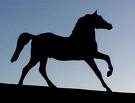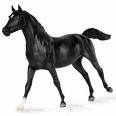If you are considering buying a new horse, there are several issues of concern to you. Smart buyers and riders know what they want before speaking to horse sellers.
It is important to know everything you can about the new horse. Learn its history, blood lines, habits, preferences, skills and overall attitude. It is also important to find out about its inherent traits. All horses have their own unique traits. Know which ones are most desirable to you.
Traits to Consider
Some horses are better at certain tasks than others. When buying a new horse, pre-determine what skills you want the horse to possess. Some to consider are:
English riding
Showing and jumping
Racing
Western riding
Trail riding
Roping
Team roping
Barrel racing
Endurance
Questions to Ask Before Buying a Horse
How much do you expect to pay? Look only at horses within your price range. What gender, color, age and size are you looking for? Weed out horses that don't fit within your requirements. Does the horse load and unload from trailers well? Will it tolerate shoeing and hoof trimming? Score your prospective horses on a scale of one to five for these items. The higher scorers will help you determine which horses are of the most interest to you.
When buying a new horse it is important to be sure it has been thoroughly evaluated. An initial inspection of the horse must be performed by someone capable and experienced. If you don't know what to look for, bring someone you trust who does. Here are the areas you need to check:
Eyes. Make sure the horse can see out of both eyes. Do a flinch test by waving your hand quickly in front of each eye. Check for any differences.
Ears. Check for excess ear wax or over-sensitivity when the ears are touched.
Mouth. Check for any lesions or sores. Be sure the teeth are normal and aligned. Watch the horse chew to check for normal biting ability.
Head, neck and chest. Check for symmetry and balance of muscles. Be sure the horse moves its head, neck and chest freely and without difficulty.
Feet. Inspect all four feet for swelling and sensitivity to touch. Flex and extend all joints to look for pain, resistance or head lifting that indicates pain or discomfort.
Rear end. Check for good tone, signs of discharge and signs of diarrhea.
Lameness. It is imperative that you are able to observe the horse trotting in circles in both directions and in a straight line. Watch closely for irregular bobbing of the head, sloppy movements or skipping that may indicate pain in any of the legs.
If the horse has passed your initial evaluation, it is time to take it for a ride. Observe its stamina, nerves and whether or not it is alert and well behaved.
If you have any doubts, either walk away or arrange an agreement based on the findings during the veterinary examinations. This is common practice and a legitimate horse seller will agree to some reasonable terms.
Be sure the three required exams are performed by a veterinarian of your choosing or one that has a neutral opinion. The required exams are:
Health certificate, which is usually for crossing state lines.
Insurance exam, to satisfy mortality and other questions related to insuring the horse.
Pre-purchase veterinary exam, detailing the medical status of the horse at the time of purchase.
When buying a horse, you want to find one that is healthy and has a good attitude. The horse's experience and dependability levels must closely match, or be above, that of the primary rider. A willing and intelligent horse can be trained to bring you years of pleasure and skilled work habits. Choose your horse wisely.
Rachel Harding has been riding horses since she was five. Sign up for our free newsletter and get all the information you need at Horse And Rider Info
Article Source: http://EzineArticles.com/?expert=Rachel_Harding
Read More..



